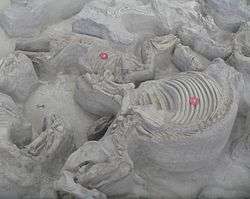Cormohipparion
Cormohipparion is an extinct genus of horse belonging to the tribe Hipparionini that lived in North America during the late Miocene to Pliocene (Hemphillian to Blancan in the NALMA classification).
| Cormohipparion | |
|---|---|
 | |
| Cormohipparion and Teleoceras in the Ashfall Fossil Beds | |
| Scientific classification | |
| Kingdom: | |
| Phylum: | |
| Class: | |
| Order: | |
| Family: | |
| Subfamily: | |
| Genus: | †Cormohipparion Skinner & MacFadden 1977 |
| Type species | |
| †Hipparion occidentale | |
| Subgenera and species | |
|
†Cormohipparion
†Notiocradohipparion
| |
Taxonomy

The genus Cormohipparion was coined for the extinct hipparionin horse "Equus" occidentale, described by Joseph Leidy in 1856.[1] However it was soon argued that the partial material fell within the range of morphological variation seen in Hipparion, and that the members of Cormohipparion belonged instead within Hipparion.[2] This rested on claims that pre-orbital morphology did not have any taxonomic significance, a claim that detailed study of quarry sections later showed to be false.[3] A reappraisal of many horse genera was thus conducted in 1984,[4] and the proposed synonymy was not acknowledged by later literature.[5]
The genus is considered to represent an ancestor to Hippotherium.[6] Its fossils have been recovered from as far south as Mexico.[7]
References
- Skinner, M. F.; MacFadden, B. J. (1977). "Cormohipparion n. gen. (Mammalia, Equidae) from the North American Miocene (Barstovian-Clarendonian)". Journal of Paleontology. Paleontological Society. 51 (5): 912–926. JSTOR 1303763.
- Forsten, A. (1982). "The Status of the Genus Cormohipparion Skinner and MacFadden (Mammalia, Equidae)". Journal of Paleontology. Paleontological Society. 56 (6): 1332–1335. JSTOR 1304669.
- MacFadden, B. J.; Skinner, M. F. (1982). "Hipparion Horses and Modern Phylogenetic Interpretation_ Comments on Forsten's View of Cormohipparion". Journal of Paleontology. Paleontological Society. 56 (6): 1336–1342. JSTOR 1304670.
- MacFadden, BJ (1984). "Systematics and phylogeny of Hipparion, Neohipparion, Nannippus, and Cormohipparion (Mammalia, Equidae) from the Miocene and Pliocene of the new world". American Museum of Natural History.
- Hulbert Jr, R. C. (1988). "A New Cormohipparion (Mammalia, Equidae) from the Pliocene (Latest Hemphillian and Blancan) of Florida". Journal of Vertebrate Paleontology. The Society of Vertebrate Paleontology. 7 (4): 451–468. doi:10.1080/02724634.1988.10011675. JSTOR 4523166.
- Woodburne, M. O. (2005). "A New Occurrence of Cormohipparion, with Implications for the Old World Hippotherium Datum". Journal of Vertebrate Paleontology. 25: 256–257. doi:10.1671/0272-4634(2005)025[0256:ANOOCW]2.0.CO;2. ISSN 0272-4634.
- Bravo-Cuevas, V. M.; Ferrusquía-Villafranca, I. (2008). "Cormohipparion (Mammalia, Perissodactyla, Equidae) from the Middle Miocene of Oaxaca, Southeastern Mexico". Journal of Vertebrate Paleontology. 28: 243–250. doi:10.1671/0272-4634(2008)28[243:CMPEFT]2.0.CO;2. ISSN 0272-4634.